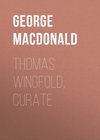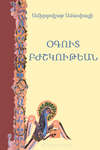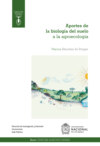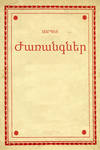Kitabı oku: «Thomas Wingfold, Curate», sayfa 9
CHAPTER XXIV. HELEN WITH A SECRET
When Helen came out into the corridor, she saw that the day was breaking. A dim, dreary light filled the dismal house, but the candle had prevented her from perceiving the little of it that could enter that room withdrawn. A pang of fear shot to her soul, and like a belated spectre or a roused somnambulist she fled across the park. It was all so like a horrible dream, from which she must wake in bed! yet she knew there was no such hope for her. Her darling lay in that frightful house, and if anyone should see her, it might be death to him. But yet it was very early, and two hours would pass before any of the workmen would be on their way to the new house. Yet, like a murderer shaken out of the earth by the light, she fled. When she was safe in her own room, ere she could get into bed, she once more turned deadly sick, and next knew by the agonies of coming to herself that she had fainted.
A troubled, weary, EXCITED sleep followed. She woke with many a start, as if she had sinned in sleeping, and instantly for very weariness, dozed off again. How kind is weariness sometimes! It is like the Father’s hand laid a little heavy on the heart to make it still. But her dreams were full of torture, and even when she had no definite dream, she was haunted by the vague presence of blood. It was considerably past her usual time for rising when at length she heard her maid in the room. She got up wearily, but beyond the heaviest of hearts and a general sense of misery, nothing ailed her. Nor even did her head ache.
But she had lived an age since she woke last; and the wonder was, not that she felt so different, but that she should be aware of being the same person as before notwithstanding all that had passed. Her business now was to keep herself from thinking until breakfast should be over. She must hold the “ebony box” of last night close shut even from her own eyes, lest the demons of which it was full should rush out and darken the world about her. She hurried to her bath for strength: the friendly water would rouse her to the present, make the past recede like a dream, and give her courage to face the future. Her very body seemed defiled by the knowledge that was within it. Alas! how must poor Leopold feel, then! But she must not think.
All the time she was dressing, her thoughts kept hovering round the awful thing like moths around a foul flame, from which she could not drive them away. Ever and again she said to herself that she must not, yet ever and again she found herself peeping through the chinks of the thought-chamber at the terrible thing inside—the form of which she could not see—saw only the colour—red,—red mingled with ghastly whiteness. In all the world, her best-loved, her brother, the child of her grandfather, was the only one who knew how that thing came there.
But while Helen’s being was in such tumult that she could never more be the cool, indifferent, self-contented person she had hitherto been, her old habits and forms of existence were now of endless help to the retaining of her composure and the covering of her secret. A dim gleam of gladness woke in her at the sight of the unfinished cap, than which she could not have a better excuse for her lateness, and when she showed it to her aunt with the wish of many happy returns of the day, no second glance from Mrs. Ramshorn added to her uneasiness.
But oh, how terribly the time crept in its going! for she dared not approach the deserted house while the daylight kept watching it like a dog; and what if Leopold should have destroyed himself in the madness of his despair before she could go to him! She had not a friend to help her. George Bascombe?—she shuddered at the thought of him. With his grand ideas of duty, he would be for giving up Leopold that very moment! Naturally the clergyman was the one to go to—and Mr. Wingfold had himself done wrong. But he had confessed it! No—he was a poor creature, and would not hold his tongue! She shook at every knock at the door, every ring at the bell, lest it should be the police. To be sure, he had been comparatively little there, and naturally they would seek him first at Goldswyre—but where next? At Glaston, of course. Every time a servant entered the room she turned away, lest her ears should make her countenance a traitor. The police might be watching the house, and might follow her when she went to him! With her opera-glass, she examined the meadow, then ran to the bottom of the garden, and lying down, peered over the sunk fence. But not a human being was in sight. Next she put on her bonnet, with the pretence of shopping, to see if there were any suspicious-looking persons in the street. But she did not meet a single person unknown to her between her aunt’s door and Mr. Drew the linendraper’s. There she bought a pair of gloves, and walked quietly back, passing the house, and going on to the Abbey, without meeting one person at whom she had to look twice.
All the time her consciousness was like a single intense point of light in the middle of a darkness it could do nothing to illuminate. She knew nothing but that her brother lay in that horrible empty house, and that, if his words were not the ravings of a maniac, the law, whether it yet suspected him or not, was certainly after him, and if it had not yet struck upon his trail, was every moment on the point of finding it, and must sooner or later come up with him. She MUST save him—all that was left of him to save! But poor Helen knew very little about saving.
One thing more she became suddenly aware of as she re-entered the house—the possession of a power of dissimulation, of hiding herself, hitherto strange to her, for hitherto she had had nothing, hardly even a passing dislike to conceal. The consciousness brought only exultation with it, for her nature was not yet delicate enough to feel the jar of the thought that neither words nor looks must any more be an index to what lay within her.
CHAPTER XXV. A DAYLIGHT VISIT
But she could not rest. When would the weary day be over, and the longed-for rather than welcome night appear? Again she went into the garden, and down to the end of it, and looked out over the meadow. Not a creature was in sight, except a red and white cow, a child gathering buttercups, and a few rooks crossing from one field to another. It was a glorious day; the sun seemed the very centre of conscious peace. And now first, strange to say, Helen began to know the bliss of bare existence under a divine sky, in the midst of a divine air, the two making a divine summer, which throbbed with the presence of the creative spirit—but as something apart from her now, something she had had, but had lost, which could never more be hers. How could she ever be glad again, with such a frightful fact in her soul! Away there beyond those trees lay her unhappy brother, in the lonely house, now haunted indeed. Perhaps he lay there dead! The horrors of the morning, or his own hand, might have slain him. She must go to him. She would defy the very sun, and go in the face of the universe. Was he not her brother?—Was there no help anywhere? no mantle for this sense of soul-nakedness that had made her feel as if her awful secret might be read a mile away, lying crimson and livid in the bottom of her heart. She dared hardly think of it, lest the very act should betray the thing of darkness to the world of light around her. Nothing but the atmosphere of another innocent soul could shield hers, and she had no friend. What did people do when their brothers did awful deeds? She had heard of praying to God—had indeed herself told her brother to pray, but it was all folly—worse, priestcraft. As if such things AND a God could exist together! Yet, even with the thought of denial in her mind, she looked up, and gazed earnestly into the wide innocent mighty space, as if by searching she might find some one. Perhaps she OUGHT to pray. She could see no likelihood of a God, and yet something pushed her towards prayer. What if all this had come upon her and Poldie because she never prayed! If there were such horrible things in the world, although she had never dreamed of them—if they could come so near her, into her very soul, making her feel like a murderess, might there not be a God also, though she knew nothing of his whereabouts or how to reach him and gain a hearing? Certainly if things went with such hellish possibilities at the heart of them, and there was no hand at all to restrain or guide or restore, the world was a good deal worse place than either the Methodists or the Positivists made it out to be. In the form of feelings, not of words, hardly even of thoughts, things like these passed through her mind as she stood on the top of the sunk fence and gazed across the flat of sunny green before her. She could almost have slain herself to be rid of her knowledge and the awful consciousness that was its result. SHE would have found no difficulty in that line of Macbeth:—“To know my deed, ‘twere best not know myself.”—But all this time there was her brother! She MUST go to him. “God hide me,” she cried within her. “But how can he hide me,” she thought, “when I am hiding a murderer?” “O God,” she cried again, and this time in an audible murmur, “I am his sister, thou knowest!” Then she turned, walked back to the house, and sought her aunt.
“I have got a little headache,” she said quite coolly, “and I want a long walk. Don’t wait luncheon for me. It is such a glorious day! I shall go by the Millpool road, and across the park. Good-bye till tea, or perhaps dinner-time even.”
“Hadn’t you better have a ride and be back to luncheon? I shan’t want Jones to-day,” said her aunt mournfully, who, although she had almost given up birthdays, thought her niece need not quite desert her on the disagreeable occasion.
“I’m not in the humour for riding, aunt. Nothing will do me good but a walk. I shall put some luncheon in my bag.”
She went quietly out by the front door, walked slowly, softly, statelily along the street and out of the town, and entered the park by the lodge-gate. She saw Rachel at her work in the kitchen as she passed, and heard her singing in a low and weak but very sweet voice, which went to her heart like a sting, making the tall, handsome, rich lady envy the poor distorted atom who, through all the fogs of her winter, had yet something in her that sought such utterance. But, indeed, if all her misery had been swept away like a dream, Helen might yet have envied the dwarf ten times more than she did now, had she but known how they stood compared with each other. For the being of Helen to that of Rachel was as a single, untwined primary cell to a finished brain; as the peeping of a chicken to the song of a lark—I had almost said, to a sonata of Beethoven.
“Good day, Rachel,” she said, calling as she passed, in a kindly, even then rather condescending voice, through the open door, where a pail of water, just set down, stood rocking the sun on its heaving surface, and flashing it out again into the ocean of the light. It seemed to poor Helen a squalid abode, but it was a home-like palace, and fairly furnished, in comparison with the suburban villa and shop-upholstery which typified the house of her spirit—now haunted by a terrible secret walking through its rooms, and laying a bloody hand upon all their whitenesses.
There was no sound all the way as she went but the noise of the birds, and an occasional clank from the new building far away. At last, with beating heart and scared soul, she was within the high garden-wall, making her way through the rank growth of weeds and bushes to the dismal house. She entered trembling, and the air felt as if death had been before her. Hardly would her limbs carry her, but with slow step she reached the hidden room. He lay as she had left him. Was he asleep, or dead? She crept near and laid her hand on his forehead. He started to his feet in an agony of fright. She soothed and reassured him as best she was able. When the paroxysm relaxed—
“You didn’t whistle,” he said.
“No; I forgot,” answered Helen, shocked at her own carelessness. “But if I had, you would not have heard me: you were fast asleep.”
“A good thing I was! And yet no! I wish I had heard you, for then by this time I should have been beyond their reach.”
Impulsively he showed her the short dangerous looking weapon he carried. Helen stretched out her hand to take it, but he hurriedly replaced it in his pocket.
“I will find some water for you to wash with,” said Helen. “There used to be a well in the garden, I remember. I have brought you a shirt.”
With some difficulty she found the well, all but lost in matted weeds under an ivy-tod, and in the saucer of a flower-pot she carried him some water, and put the garment with the horrible spot in her bag, to take it away and destroy it. Then she made him eat and drink. He did whatever she told him, with a dull, yet doglike obedience. His condition was much changed; he had a stupefied look, and seemed only half awake to his terrible situation. Yet he answered what questions she put to him even too readily—with an indifferent matter-of-factness, indeed, more dreadful than any most passionate outburst. But at the root of the apparent apathy lay despair and remorse,—weary, like gorged and sleeping tigers far back in their dens. Only the dull torpedo of misery was awake, lying motionless on the bottom of the deepest pool of his spirit.
The mood was favourable to the drawing of his story from him, but there are more particulars in the narrative I am now going to give than Helen at that time learned.
CHAPTER XXVI. LEOPOLD’S STORY
While yet a mere boy, scarcely more than sixteen, Leopold had made acquaintance with the family of a certain manufacturer, who, having retired from business with a rapidly-gained fortune, had some years before purchased an estate a few miles from Goldswyre, his uncle’s place. Their settling in the neighbourhood was not welcome to the old-fashioned, long-rooted family of the Lingards; but although they had not called upon them, they could not help meeting them occasionally. Leopold’s association with them commenced just after he had left Eton, between which time and his going up to Cambridge he spent a year in reading with his cousins’ tutor. It was at a ball he first saw Emmeline, the eldest of the family. She had but lately returned from a school at which from the first she had had for her bedfellow a black ewe. It was not a place where any blackness under that of pitch was likely to attract notice, being one of those very ordinary and very common schools where everything is done that is done, first for manners, then for accomplishments, and lastly for information, leaving all the higher faculties and endowments of the human being as entirely unconsidered as if they had no existence. Taste, feeling, judgment, imagination, conscience, are in such places left to look after themselves, and the considerations presented to them, and duties required of them as religious, are only fitted to lower still farther such moral standard as they may possess. Schools of this kind send out, as their quota of the supply of mothers for the ages to come, young women who will consult a book of etiquette as to what is ladylike; who always think what is the mode, never what is beautiful; who read romances in which the wickedness is equalled only by the shallowness; who write questions to weekly papers concerning points of behaviour, and place their whole, or chief delight in making themselves attractive to men. Some such girls look lady-like and interesting, and many of them are skilled in the arts that meet their fullest development in a nature whose sense of existence is rounded by its own reflection in the mirror of self-consciousness falsified by vanity. Once understood, they are for a sadness or a loathing, after the nature that understands them; till then, they are to the beholder such as they desire to appear, while under the fair outside lies a nature whose vulgarity, if the most thorough of changes do not in the meantime supervene, will manifest itself hideously on the approach of middle age, that is, by the time when habituation shall have destroyed the restraints of diffidence. Receiving ever fresh and best assurance of their own consequence in the attention and admiration of men, such girls are seldom capable of any real attachment, and the marvel is that so few of them comparatively disgrace themselves after marriage.
Whether it was the swarthy side of his nature, early ripened under the hot Indian sun, that found itself irresistibly drawn to the widening of its humanity in the flaxen fairness of Emmeline, or the Saxon element in him seeking back to its family—it might indeed have been both, our nature admitting of such marvellous complexity in its unity,—he fell in love with her, if not in the noblest yet in a very genuine, though at the same time very passionate way; and as she had, to use a Scots proverb, a crop for all corn, his attentions were acceptable to her. Had she been true-hearted enough to know anything of that love whose name was for ever suffering profanation upon her lips, she would, being at least a year and a half older than he, have been too much of a woman to encourage his approaches—would have felt he was a boy and must not be allowed to fancy himself a man. But to be just, he did look to English eyes older than he was. And then he was very handsome, distinguished-looking, of a good family, which could in no sense be said of her,—and with high connections—at the same time a natural contrast to herself, and personally attractive to her. The first moment she saw his great black eyes blaze, she accepted the homage, laid it on the altar of her self-worship, and ever after sought to see them lighted up afresh in worship of her only divinity. To be feelingly aware of her power over him, to play upon him as on an instrument, to make his cheek pale or glow, his eyes flash or fill, as she pleased, was a game almost too delightful.
One of the most potent means for producing the humano-atmospheric play in which her soul thus rejoiced, and one whose operation was to none better known than to Emmeline, was jealousy, and for its generation she had all possible facilities—for there could not be a woman in regard of whom jealousy was more justifiable on any ground except that of being worth it. So far as it will reach, however, it must be remembered, in mitigation of judgment, that she had no gauge in herself equal to the representation of a tithe of the misery whose signs served to lift her to the very Paradise of falsehood: she knew not what she did, and possibly knowledge might have found in her some pity and abstinence. But when a woman, in her own nature cold, takes delight in rousing passion, she will, selfishly confident in her own safety, go to strange lengths in kindling and fanning the flame which is the death of the other.
It is far from my intention to follow the disagreeable topic across the pathless swamp through which an elaboration of its phases would necessarily drag me. Of morbid anatomy, save for the setting forth of cure, I am not fond, and here there is nothing to be said of cure. What concerns me as a narrator is, that Emmeline consoled and irritated and re-consoled Leopold, until she had him her very slave, and the more her slave that by that time he knew something of her character. The knowledge took from him what little repose she had left him; he did no more good at school, and went to Cambridge with the conviction that the woman to whom he had given his soul, would be doing things in his absence the sight of which would drive him mad. Yet somehow he continued to live, reassured now and then by the loving letters she wrote to him, and relieving his own heart while he fostered her falsehood by the passionate replies he made to them.
From a sad accident of his childhood, he had become acquainted with something of the influences of a certain baneful drug, to the use of which one of his attendants was addicted, and now at college, partly from curiosity, partly from a desire to undergo its effects, but chiefly in order to escape from ever-gnawing and passionate thought, he began to make EXPERIMENTS in its use. Experiment called for repetition—in order to verification, said the fiend,—and repetition led first to a longing after its effects, and next to a mad appetite for the thing itself; so that, by the time of which my narrative treats, he was on the verge of absolute slavery to its use, and in imminent peril of having to pass the rest of his life in alternations of ecstasy and agony, divided by dull spaces of misery, the ecstasies growing rarer and rarer, and the agonies more and more frequent, intense, and lasting; until at length the dethroned Apollo found himself chained to a pillar of his own ruined temple, which the sirocco was fast filling with desert sand.




















